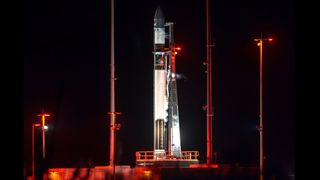
Rocket Lab's debut mission from American soil will lift off less than two weeks from now, if all goes according to plan.
The launch window for Rocket Lab's "Virginia Is for Launch Lovers" mission will open on Jan. 23, the company announced on Wednesday (Jan. 11). The flight will lift off from NASA's Wallops Flight Facility in Virginia (hence the name).
The launch window runs from 6 p.m. to 8 p.m. EST on Jan. 23 (2300 GMT to 0100 GMT on Jan. 24) and on the daily backup dates, which run through early February. You can watch the liftoff here at Space.com when the time comes.
Related: Rocket Lab's 1st US launch may be visible along East Coast
Rocket Lab's 59-foot-tall (18 meters) Electron launcher has flown more than 30 orbital missions to date, all of them from the company's Launch Complex 1 in New Zealand.
"Virginia Is for Launch Lovers" will break in Launch Complex 2 as the first flight from the facility. The mission had been targeted to fly last month, but unfavorable weather pushed the liftoff into January.
On the upcoming launch, the expendable Electron will carry three radio-frequency surveillance satellites for Virginia-based company HawkEye 360. The three are the first of 15 HawkEye 360 satellites that Rocket Lab will loft over the course of three missions in 2023 and 2024.
Get the Space.com Newsletter
Breaking space news, the latest updates on rocket launches, skywatching events and more!
"These missions will grow HawkEye 360's constellation of radio frequency monitoring satellites, enabling the company to better deliver precise mapping of radio frequency emissions anywhere in the world," Rocket Lab wrote in a mission description.
Rocket Lab is working to make Electron's first stage reusable. The company has recovered and analyzed boosters after several previous missions, on one occasion even successfully plucking a returning Electron out of the sky with a helicopter. (That's Rocket Lab's desired recovery strategy, given that Electron is too small to have enough fuel left over after launch for powered Earth returns.)
However, there will be no recovery efforts on "Virginia Is for Launch Lovers," company representatives said.
Mike Wall is the author of "Out There" (Grand Central Publishing, 2018; illustrated by Karl Tate), a book about the search for alien life. Follow him on Twitter @michaeldwall. Follow us on Twitter @Spacedotcom or on Facebook.
Join our Space Forums to keep talking space on the latest missions, night sky and more! And if you have a news tip, correction or comment, let us know at: community@space.com.

Michael Wall is a Senior Space Writer with Space.com and joined the team in 2010. He primarily covers exoplanets, spaceflight and military space, but has been known to dabble in the space art beat. His book about the search for alien life, "Out There," was published on Nov. 13, 2018. Before becoming a science writer, Michael worked as a herpetologist and wildlife biologist. He has a Ph.D. in evolutionary biology from the University of Sydney, Australia, a bachelor's degree from the University of Arizona, and a graduate certificate in science writing from the University of California, Santa Cruz. To find out what his latest project is, you can follow Michael on Twitter.